Sofia Coppola's Feminine Exploration Of Womanhood Is A Lost Art In Film
Director Sofia Coppola’s work was dismissed for years as being superficially frilly, frivolous, and girly. Her films were seen as lacking depth, luring you in with pastel colors, beautiful girls, and relics of adolescence but lacking deeper substance.
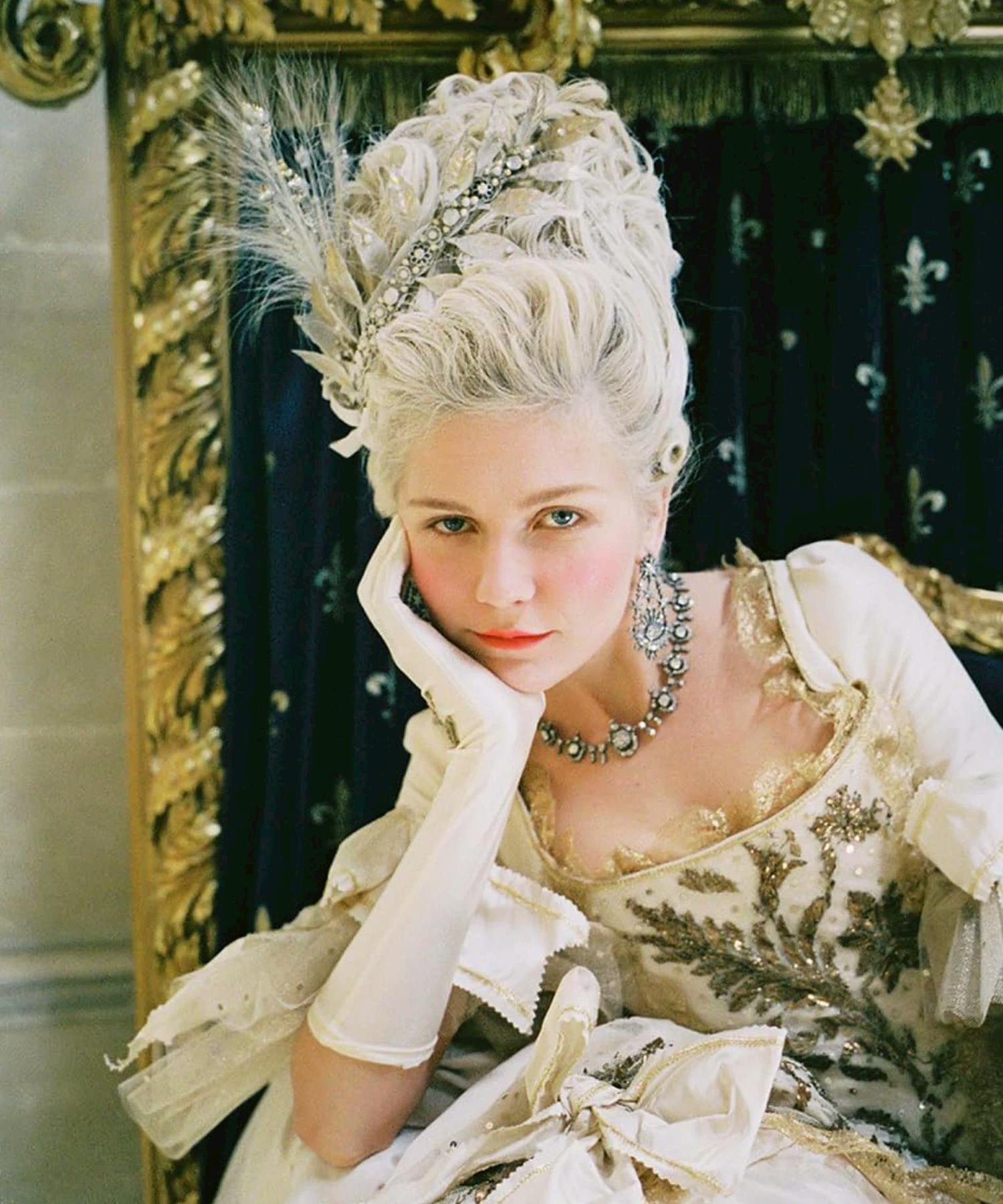
This criticism is funny, however, because Coppola’s visuals are perhaps her most striking talent, saying a great deal without verbalizing anything at all. Coppola is a master of showing, not telling – a rare quality in today’s film, much less films that are merely vehicles for social commentary.
Some of the most feminist films of the ‘90s didn’t feel like feminist think pieces because as much as they did contain these themes, they had an overarching story, which was never overshadowed by its underlying social politics. This made films like The Silence of the Lambs incredible thrillers, adored and enjoyed by all while making subtle statements about what it’s like to maneuver in the world as a woman. Art should never come secondary to politics. That doesn’t mean to avoid making art political, as the two are closely intertwined. Instead, filmmakers should recognize that the personal is political. By exploring the mundanity of everyday life, we can extrapolate greater meaning from the ordinary.
Modern Feminism in Film
Feminist themes, once integral pieces of beautiful, insightful stories about the unique experiences of girlhood, have become so sanctimonious that they’re ruining films. If you’ve watched a movie in the past 10 years, you’re bound to have noticed this dynamic shift in tone and messaging. But as Hollywood has embraced the strong female archetype, we’ve relegated women who aren’t strong, independent, or career-driven as antiquated or lesser. A female caricature is no more compelling or dignified than “hot girl #3.” The latter may actually be more dignified. At least it’s honest.
Depictions of women have cheapened the unique experience of womanhood – women reduced to performing masculinity, masquerading as depth. Worse, though, is the writing. And direction. And general “delulu” worldview dictating every decision on set. It’s not enough to pillage modern cinema, though, they also have to poison the greats. What’s good for the goose is good for the gander. So, our fairytales will no longer be about love. We’ll turn our Barbie dolls into think pieces about female suffering. We’ll create stories about how vulnerability, femininity, and tenderness are bad because they’re docile in nature. If women are the opposite of their historical portrayals, that's feminism! If women are complicated or, God forbid, weak, we’d rather not identify with them. But that’s the life most real women lead. They get passed over for promotions because they fear confronting their bosses. They stay in toxic, abusive relationships because they’re trauma-bonded to a man they believe loves them. A significant portion have personality disorders that render them emotionally unstable, perhaps lacking any sense of self at all.
In the process, feminine ideals of nurturing, warmth, passivity, humility, sweetness, and emotionality are subverted in favor of “objectively better” masculine traits like independence, aggression, stoicism, assertiveness, and courage. Why must a woman be courageous, strong, and independent to have value? Why does yearning to love and be loved make her pathetic? Why should Snow White retcon the love story with her prince, instead opting to make it a story about her becoming a leader? Quite honestly, it reeks of internalized misogyny – a term feminists love to throw around whenever a woman disagrees with them. I can’t think of anything more deserving of the title, however, than the ingrained belief that femininity is something to be loathed, avoided, and suppressed. There’s nothing more universal than a woman’s desire to love and be loved, and to be a mother, and though women aren’t a monolith, feminist cinema has no problem with brandishing them as such, so long as it’s in their preferred direction.
The Problem with Barbie
When I went to see Greta Gerwig’s Barbie, the most anticipated film of the summer, I was ecstatic. I dressed in my Barbie-centric pink outfit and headed out with my loved ones, ready to have a ball. Sure, I’m critical of feminism, but I know how to have a good time. Unfortunately, I was met with a slog of cringe even my apolitical, chronically offline best friend couldn’t handle. As soon as the credits rolled, she turned to me to say, “That movie was, like, really feminist.” Semantics aside, there’s a monologue word-vomited by America Ferrera that is just a Tumblr post a 14-year-old would make in 2012, thinking it’s profound.
It was overt, obvious, on-the-nose. Everything I hate about modern movies. Women praised it for saying what every woman is thinking about the impossible standards thrust onto women. But these expectations are no more oppressive than the expectations thrust onto men, and her verbalization of these burdens only trivializes them, as they don’t amount to anything profound or insightful. It’s simply verbal diarrhea.
The problem isn’t that Barbie is a feminist movie. Barbie is inherently a feminist doll. It’s the overbearing manner in which the subject is handled, lacking care, grace, and subtlety. You’re beat over the head with it, as is the case with modern feminist-laden films. Contrast this with American director and screenwriter Sofia Coppola’s work, which is overwhelmingly visual. The emotions wash over you as you’re imbued with color palettes that convey certain emotions like loneliness and isolation. Kent Jones wrote in his review of The Bling Ring, “Sofia Coppola is uncommonly gifted at the articulation of something so fleeting and ephemeral that it seems to be on the verge of evaporating on contact with her hovering, deadpan, infinitely patient camera eye.”
Let’s look at two of Coppola’s films – The Virgin Suicides and Marie Antoinette – and see how her approach to telling stories about the female experience is not only more artistic but deeper, more interesting, and more entertaining.
The Virgin Suicides
In The Virgin Suicides, Coppola presents us a tale about five young girls whose dreamy, coquette existence is contrasted with the suffocating repression they face from their religious, conservative mother after the untimely suicide of her 13-year-old daughter. A group of boys across the street become consumed with gaining access to the inner lives of the five Lisbon sisters, who each take their own life by the end of the film. Through stolen glimpses in windows and overt invasions of privacy, the boys become obsessed with the girls. While the Lisbon girls are alive, the boys are too shy and intimidated to converse with them, but their beauty and femininity are so alluring that the boys sneak into their rooms to rummage through their belongings, looking at a tampon like a relic from an alien society.
After acquiring Cecilia’s diary, the 13-year-old who takes her own life first, they scan through her entries, happy to skip over all of the filler of her life to get to the juicy parts. They become engrossed, even as adults, with uncovering the mystery of what drove the Lisbon sisters to their untimely deaths, but only on a surface level. They don’t really care about the girls’ inner turmoil, depression, grief, or repressive home life because they never asked about or tried to get to know the girls on a genuine level. At its core, The Virgin Suicides is about the male gaze, and Coppola brilliantly depicts this through the narration of the girls’ lives exclusively by the boys, as well as the excessively dainty visuals. Getting distracted by Coppola’s aesthetics is a litmus test because the visuals reveal the subtext. We never get to know the inner lives of the Lisbon sisters any more than the boys do because they’re an unreliable narrator, merely recalling memories they have of them as they watched from afar, creepily spying on them and stealing their things.
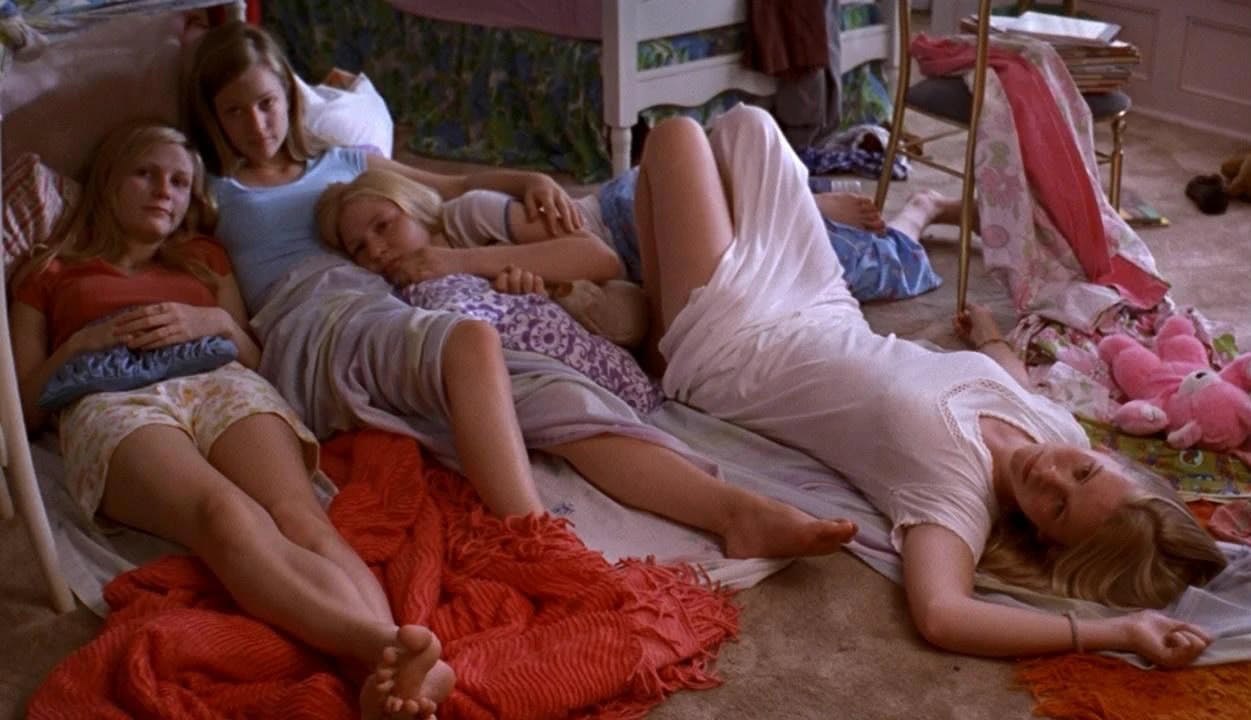
The boys project their idealized fantasies onto the girls. They’re enamored with their youthful beauty, which they objectify and sexualize at every turn. Their infatuation leads them to daydream about the girls as pristine, dainty, and mysterious, but empty in content. Coppola intersperses authentic experiences of girlhood with fantasies of how the boys envision they must act when unobserved. This is emphasized through fantasies the boys have of the girls lying around in fields, brooding and looking ethereal. A unicorn appears on screen, and we catch the sight of Lux dancing in a hula girl get-up with fainting images, signifying there’s nothing realistic about these images. While the boys claim to be interested in what led to the girls ending their lives so cruelly short, they repeatedly demonstrate that they don’t see the Lisbon girls as complex people but as objects of desire whom they can repeatedly violate by intruding into their privacy, even after death.
They have no deeper experiences than what the boys imagine for them. It echoes the female sentiment, “To be a woman is to perform.” They indulge in viewing the girls voyeuristically, like the images of a porno magazine. As the boys recount their relationship with the girls, the elephant in the room is they had no deep relationship with these girls and that they drastically overestimate their own significance in their lives. They could barely utter a word to the girls in person, and after their mother locks them in the house, they communicate exclusively through music and morse code flashlights.
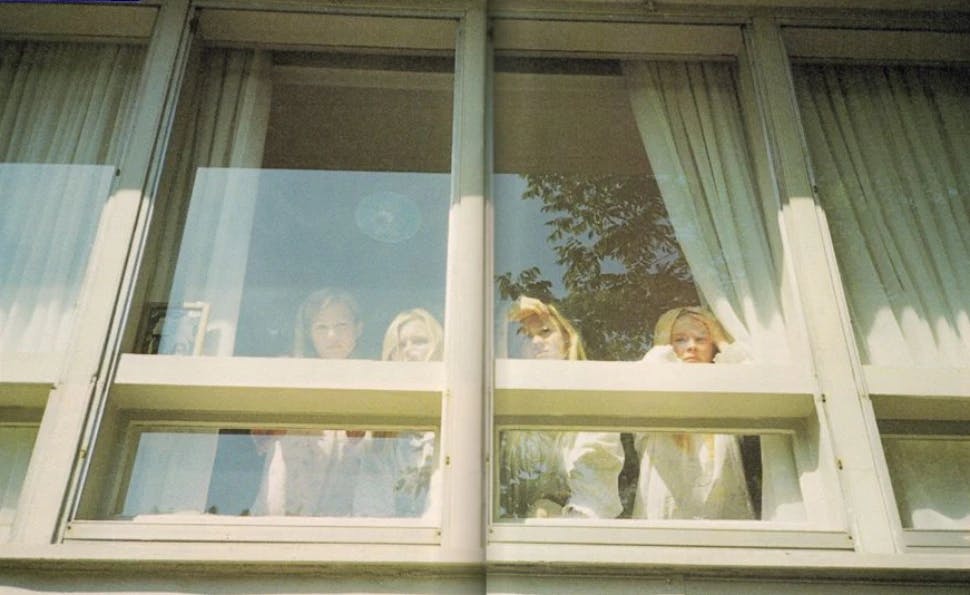
Even when Cecilia brutally kills herself during a party thrown for her birthday, traumatizing her mother and all of her sisters, the boys can’t help but stare, continually turning around to catch another glimpse. They develop a parasocial relationship with the girls through Cecilia’s diary, but are grossly disinterested in most of her journal entries, opting to skip to the good stuff – notably, Lux’s sexual escapades. It’s not the inner lives of the girls they’re interested in. There’s something sick and twisted about their indulgence in exploiting their tragedy without any legitimate curiosity about who they were as people.
In Coppola’s films, girlhood is an isolating experience that others don’t understand. After Cecilia’s first suicide attempt, her own doctor dismisses her melancholy. By asking her, “What are you doing here, honey? You're not even old enough to know how bad life gets,” he trivializes her suffering. Cecilia replies, “Obviously, doctor, you’ve never been a 13-year-old girl.” This line is simple, to the point, and up to interpretation. It probably means little to men, or even sounds laughable, but its meaning is intuitive to women who know all too well the horrors of being a young girl going through puberty – whose first awareness of her sexual desirability is thrust onto her through the creepy peering eyes and whistles of much older men. That she will, in all likelihood, never experience more sexual attention in her life than she does at the age of 13 years old. Instead, in today’s feminist films, we get regurgitated preachy monologues by out-of-touch Hollywood actresses who owe their careers to diversity initiatives and representation.
Marie Antoinette
Marie Antoinette follows the life of the ill-fated queen of France from age 14 to 19, when the royals had to flee Versailles. Coppola’s anachronistic depiction of the 1700s is filled with frilly pastel dresses, a modern synth-pop soundtrack, and a brighter-than-traditional color palette for the time period. Coppola’s set design choices all emphasize Antoinette’s youth at the time of the film – just 14 years old when she’s married off to Louis XVI. Coppola’s intention is to sidestep traditional Antoinette discourse by reminding us at every turn that she was just a girl, like us. She was naive, ignorant, sad, lonely, and clueless. The modern soundtrack contrasted with the setting helps us traverse time and get to know the core of her soul, to make her relatable.
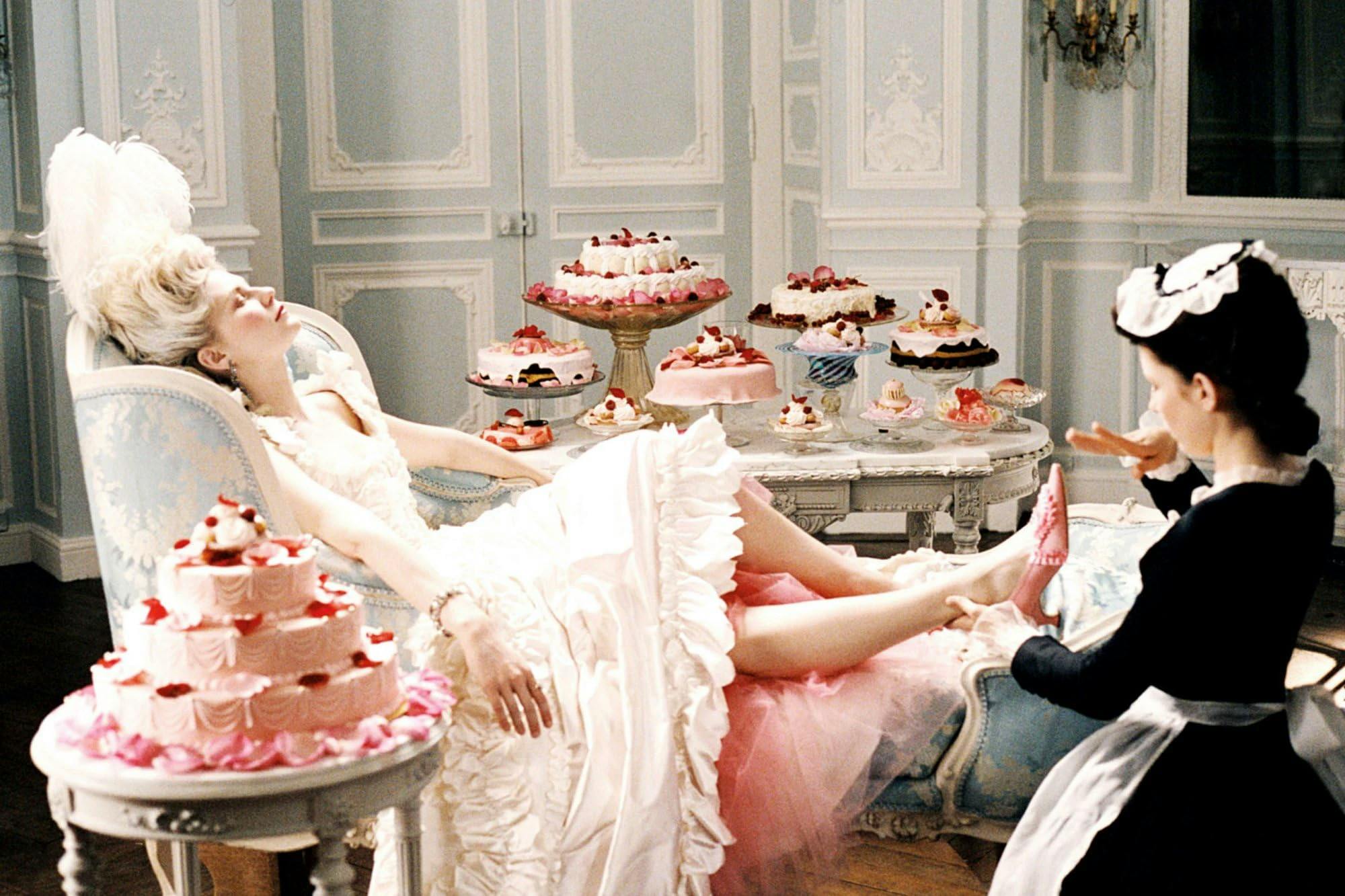
Coppola isn’t interested in presenting a historically accurate account of Marie Antoinette’s life. She’s interested in conveying universal emotions like isolation, loneliness, and alienation so we’re reminded that even a privileged dauphine born into royalty and excess was, at the end of the day, not much different from you and me. She’s overwhelmed by the expectations thrust onto her by society and her incapability of producing a male heir. Despite being generally clueless, vapid, and immature, a lot is riding on her. We’re told this story exclusively through Antoinette’s perspective to show us how sheltered she was in the gates of Versailles, entirely clueless to the outside world, let alone the suffering of her people.
As Roger Ebert said in his 2006 review of the film, “Coppola's oblique and anachronistic point of view shifts the balance away from realism and into an act of empathy for a girl swept up by events that leave her without personal choices. Before she was a queen, before she was a pawn, Marie was a 14-year-old girl taken from her home, stripped bare, and examined like so much horseflesh. It is astonishing with what indifference for her feelings the court aristocracy uses her for its pleasure and, in killing her, disposes of its guilt.”
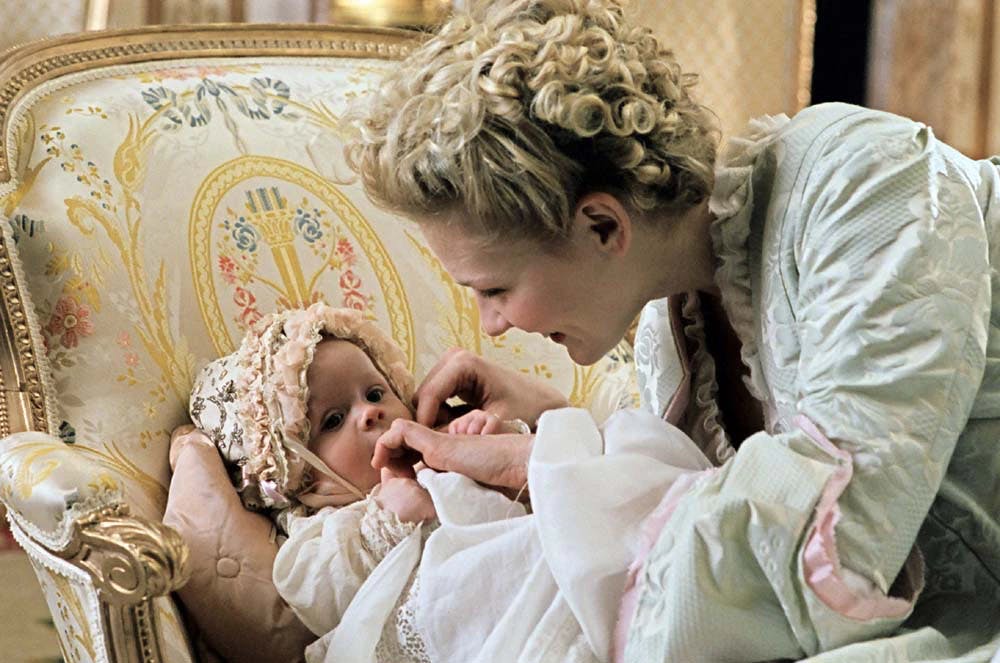
A character study of Marie Antoinette as a girl was the perfect vehicle for Coppola’s social commentary because we’re reminded she’s an adolescent when this life is forced upon her. The film is critical of Antoinette’s gluttonous, mindless consumption and obliviousness to the plight of anything happening outside her gilded cage, but it also forces us to empathize with her. How many of us would be so much more sophisticated, astute, and self-actualized as a 14-year-old girl, whisked away from her family to live in a foreign land, stripped naked of all her possessions (including her beloved dog), and burdened with producing a male heir to legitimize the respective union between their two countries? This burden, which is largely the fault of her husband, who explicitly rejects her attempts to initiate intimacy, is placed squarely on her, and she bears sole blame for each day she fails to do the deed.
Montages of her indulgence interspersed with scenes of her melancholy as she faces harsh criticism, lack of belonging, and a heavy burden as queen remind us that privilege and wealth do little to nourish the soul. It isn’t until she has a child that she feels comfortable enough in herself to embrace a more toned-down, natural likeness. When she embraces motherhood, she finds fulfillment outside the stifling royal court and its inescapable expectations. Coppola, who knows all too well the burdens of being born into wealth, fame, and nepotism, is both highly sympathetic to figures like Antoinette and critical of them. Themes of women born into privilege who find themselves alienated, misunderstood, or lacking connection are a staple of her work, but she doesn’t allow it to excuse Anoinette’s faults. What results is a thoughtful, nuanced depiction of a highly controversial figure. But perhaps Coppola could have saved time with a heavyhanded monologue about an excessively self-aware dauphine owning the patriarchy – I’m glad she didn’t.
Closing Thoughts
Coppola’s filmography is not an exclusively feminist practice. Her films are more accurately described as character studies with a uniquely feminine touch. She captures the essence of what it feels like to be a young girl growing into a woman that cannot be articulated in words. She reveals seedy behaviors on the part of men without excessive moralistic dialogue. She instead allows these unbearable feelings to wash over you, making you feel uncomfortable. The Barbie monologue is bad because it tells us what to think so overtly. I don’t want you to tell me what it’s like to be a woman. I want you to show me, like Coppola does.
Support our cause and help women reclaim their femininity by subscribing today.